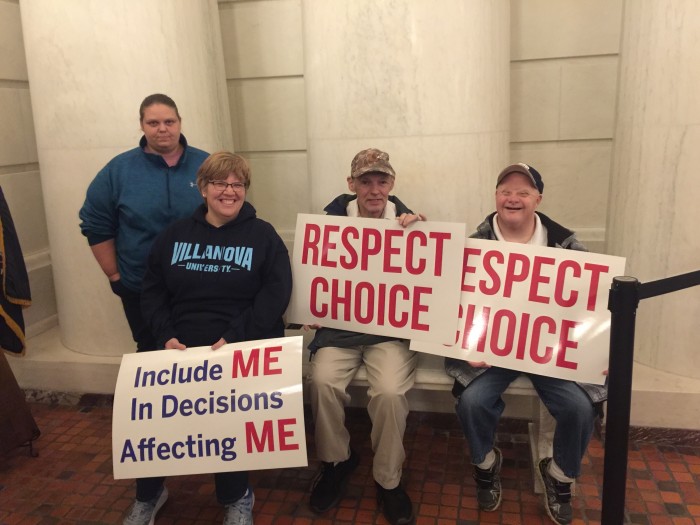Press Release from Governor Tom Wolf
Council on Reform Submits Recommendations for the Protection of Vulnerable Populations to Gov. Wolf
> Public Comment Period through December 16, 2019 <
November 1, 2019
Harrisburg, PA – Today, Governor Tom Wolf’s Council on Reform, established through his Protection of Vulnerable Populations Executive Order 2019-05, submitted its recommendations for improving the state’s systems to protect its most vulnerable individuals and families.
In late July, Gov. Wolf charged this diverse group of community leaders, providers, stakeholders, and cabinet members with taking a comprehensive look at needs to best serve the state’s vulnerable populations with a mandate to report those recommendations back to him by Nov. 1.
“I took action in July to address long-standing issues with the state’s systems designed to protect our most vulnerable,” Gov. Wolf said. “The first task for the newly formed Council on Reform was to buckle down and develop a comprehensive list of recommendations for how we can best protect vulnerable Pennsylvanians.
“My thanks to all of the council members who shared their expertise and considerable time, and to those who participated by meeting with council members or submitting information and recommendations. Your tireless commitment to this process demonstrates your passion for protecting all Pennsylvanians, especially our most vulnerable. I look forward to reading and analyzing these recommendations and to our next steps to make much-needed changes.”
The 25-member council held its first meeting immediately following the governor’s announcement. In determining its charter and scope, the council defined populations and subpopulations, established committees, and adopted values.
The council determined it would look at protecting vulnerable populations from three perspectives with a separate committee for each: prevention and diversion, protection and intervention, and justice and support.
Populations were broken out by age with subpopulations to ensure vulnerabilities unique to each were considered:
Ages 0-17
Subpopulations – African Americans, Asian American & Pacific Islanders, Latinos, LGBTQ+ children, young women, children experiencing mental illness, children with intellectual disabilities/autism, children with physical/sensory disabilities, delinquent children, and dependent children
Ages 18-59
Subpopulations – African Americans, Asian American & Pacific Islanders, Latinos, LGBTQ+ adults, veterans, women, adults experiencing mental illness, adults with intellectual disabilities/autism, adults with physical/sensory disabilities, adults with Alzheimer’s or a related dementia, and domestic violence victims
Ages 60+
Subpopulations – African Americans, Asian American & Pacific Islanders, Latinos, LGBTQ+ seniors, women, veterans, seniors experiencing mental illness, seniors with intellectual disabilities/autism, seniors with physical/sensory disabilities, seniors with Alzheimer’s or a related dementia, and domestic violence victims
The council recommended two overarching goals for Pennsylvania to better protect vulnerable populations:
• Empower and strengthen the workforce serving vulnerable populations by providing comprehensive training, livable salaries and benefits, and support for staff experiencing vicarious trauma.
- Empower communities and vulnerable populations by ensuring access to services for all Pennsylvanians and conducting culturally appropriate and diverse outreach efforts.
The council adopted values they believe to be relevant to protecting and serving vulnerable populations – these values are reflected throughout the recommendations:
Cultural Competence – Recognizing and honoring diversity
Person-Centered Approach – Focusing on the individual’s best interest
Community Engagement – Hearing from vulnerable populations, families, experts, and stakeholders
Context & Awareness – Understanding current environment and avoiding past failings
Trauma-Informed – Utilizing trauma-informed approaches across all systems
Workforce Empowerment – Ensuring the workforce is equipped and supported
Members heard from a wide array of existing oversight and advisory bodies, stakeholders, legislators, and constituents. Information was provided through in-person meetings, letters, emails, and a webform that council members distributed to their networks. These contributors provide recommendations for the council to consider and essential insight and context to ensure the council was fully informed. Many council members also served on advisory bodies connected to this work.
The council compiled the recommendations submitted by others along with recommendations from existing reports and assigned them to the appropriate committee for review and consideration. Committee members reviewed all that was submitted, identified common trends, eliminated duplication, and developed new recommendations.
After committees finalized their lists of recommendations, themes were identified that spanned all populations and committees. The result is the comprehensive list of recommendations presented to Gov. Wolf today.
The council advised Gov. Wolf that it “fully recognizes the funding implications of the recommendations that have been developed and the substantial amount of time and work it takes to carry out these recommendations. It is our hope that Pennsylvania will rise to the occasion and put its best effort into driving this much needed change – our most vulnerable are counting on it.”
The council asked that the governor direct the appropriate agencies, organizations, branches of government, and advisory bodies to carry out the recommendations he would like to move forward.
As the council carried out its process, they believed more could be done to engage with constituents. To achieve this, the council added an online public comment form available today through Dec. 16.
View press release online


















